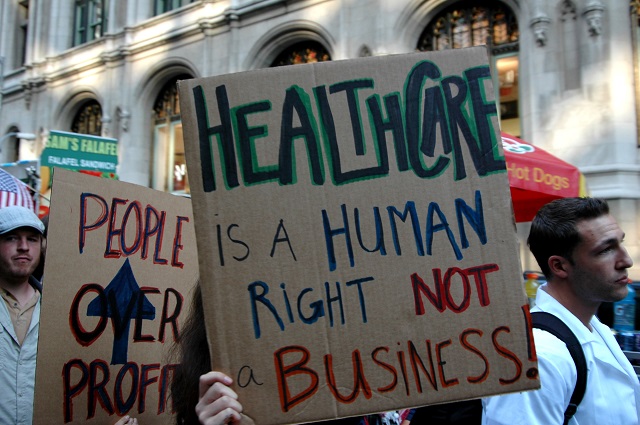
Democrats are endeavoring to point out that tens of thousands of Americans face a death sentence if House Republicans’ current healthcare plan is signed into law.
“With the repeal of the Affordable Care Act, it is estimated that 43,956 people will die,” Rep. Gwen Moore (D-Wis.) said Thursday morning, on the House floor. “Long live the Republican Party.”
But while Dems have shown an interest in saving lives, their leader is wasting an opportunity to advocate for the 27 million Americans left completely uninsured by Obamacare.
“No, I don’t,” Rep. Nancy Pelosi (D-Calif.) promptly said, when asked by a reporter if she thinks single payer should be in Democrats’ 2018 party platform.
“I was carrying single payer signs probably around before you born, so I understand that aspiration,” the House Minority Leader told Vice’s Evan McMorris-Santoro. She then claimed that “the comfort level with a broader base of the American people is not there yet,” with single payer.
“So I say to people: if you want it, do it in your states. States are laboratories,” the Dem leader added. “States are a good place to start,” she also said.
Pelosi’s assertions about single payer’s popularity, however, are called into question by public polling.
Last year, Gallup found that 58 percent of the country wants single payer to replace Obamacare, while only 37 percent oppose such a move. Other recent polls, too, have found that either a clear majority or plurality of Americans support single-payer. And polling also has shown that the most vociferous advocate of single payer, Sen. Bernie Sanders (I-Vt.), is the most popular politician in the country, by a wide margin.
Pelosi’s assertion that “states are a good place to start” is also questionable, given recent history. Sanders’ Vermont attempted to create a single payer system after Obamacare passed, but state officials got cold feet and abandoned the plan in 2014.
And though House Democrats’ leader was not even open to considering the idea of single payer on Thursday morning — with America’s healthcare system suddenly back in the limelight — House Republicans were tying their opponents to the initiative.
“Those defending this legislation had a goal,” Rep. Keith Rothfus (R-Pa.) said, referring to Obamacare. “Single payer, socialized medicine.”
The House found itself discussing Republican healthcare plans on Thursday morning, after members of the party caucus agreed to support a revised version of the Obamacare repeal plan that failed to even come up for a vote in March.
The new iteration of the plan passed on Thursday afternoon. It was changed to allow states to opt-out of the Obamacare mandate on preexisting conditions. Republicans are proposing $8 billion for state-run high-risk pools, as a replacement. Critics, like the American Medical Association, said that this would still do “serious harm.”
The March proposal would have cut coverage from some 24 million people, according to Congressional analyses. Republicans are moving their current proposal through the House without waiting for another analysis from the Congressional Budget Office.
Angry, shocked, overwhelmed? Take action: Support independent media.
We’ve borne witness to a chaotic first few months in Trump’s presidency.
Over the last months, each executive order has delivered shock and bewilderment — a core part of a strategy to make the right-wing turn feel inevitable and overwhelming. But, as organizer Sandra Avalos implored us to remember in Truthout last November, “Together, we are more powerful than Trump.”
Indeed, the Trump administration is pushing through executive orders, but — as we’ve reported at Truthout — many are in legal limbo and face court challenges from unions and civil rights groups. Efforts to quash anti-racist teaching and DEI programs are stalled by education faculty, staff, and students refusing to comply. And communities across the country are coming together to raise the alarm on ICE raids, inform neighbors of their civil rights, and protect each other in moving shows of solidarity.
It will be a long fight ahead. And as nonprofit movement media, Truthout plans to be there documenting and uplifting resistance.
As we undertake this life-sustaining work, we appeal for your support. We have 24 hours left in our fundraiser: Please, if you find value in what we do, join our community of sustainers by making a monthly or one-time gift.